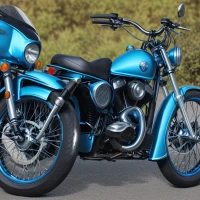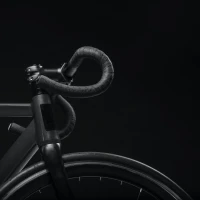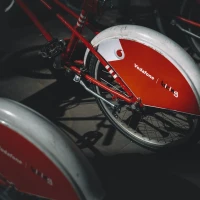The joy of pedaling the first strokes on a brand new bike is often one for the books. The smooth acceleration, the flawless shift between gears, and the anticipation of bringing your cycling game to new heights. But then, you press on the brakes slowly to come to a gentle halt, and there it is – the high-pitched squeak that immediately dampens the excitement. It’s a common scenario that leaves many cyclists wondering: why do new brakes squeak when stopping slow? In this detailed exploration, we’re going to dive into the mechanics of bicycle brakes, the various reasons why they might start squeaking straight out of the box, and most importantly, how to address this noisy enigma.
When you invest in a bike, especially a high-end model, the expectation is that every component should work seamlessly, including the braking system. But the reality is, brakes can be finicky. Understanding why they squeak and how to fix it can not only save you from an annoying ride but also ensure your safety on the road.
Sound of Discontent: The Squeaking Dilemma
Cyclists from every corner of the world have faced the conundrum of squeaking brakes. It’s a sound that can startle pedestrians, cause annoyance, and concern to the rider. Let’s dissect this issue to understand the factors contributing to this unwelcome symphony.
Material and Manufacturing Matters
The Role of Brake Components
Bike brakes are a symphony of different parts playing together. The composition of these parts is crucial. What materials are your brake pads made of? What about the discs or rims they press against?
- Brake Pads: Common materials used for brake pads include rubber, metal sintered, and organic compounds.
- Disc Rotors: These are typically made of stainless steel but can have different finishes and metal combinations that affect their interaction with the brake pads.
The Manufacturing Process
During the manufacturing process, even the minutest imperfections can lead to a squeaky brake. Flaws in the surface texture of the disc rotors or protective coatings applied unevenly can result in a brake that is more prone to squeaking.
Break-In Period: A Necessary Evil?
Every new bike goes through what is known as a break-in period. This initial phase is where the components, particularly the brakes, are getting used to the stress and strains of actual road conditions. This running-in period is often when brakes are prone to squeaking as the various elements are yet to bed in properly.
Environmental and External Factors
The Influence of Weather
One cannot rule out the effect of weather and external conditions on brake squeal. Moisture, be it from a morning dew or a recent rain, often leads to the dreaded squeaking of brakes. Likewise, certain temperature extremes can cause the materials in the brake system to expand or contract, sometimes resulting in that high-pitched sound as you slow down.
Dust and Debris: The Silent Foes
Dust and tiny particles often get lodged in between brake pads and rotors or rims. This intrusion can contribute to the squeaking of new brakes when you are stopping slow because these materials can cause uneven pressure or friction during brake application.
Anatomy of a Brake Squeak: Diving Deeper
To alleviate new brakes squeaking when stopping slow, it is imperative to full-heartedly grasp how a brake system functions and the science behind the squeaking sounds.
Friction and Heat Generation
Braking, at its core, is essentially the conversion of kinetic energy into heat through friction. The brake pads press against the rotors or rims, creating friction, which in turn slows down the wheel. But if the friction is uneven due to any reason—be it contamination, misalignment, or surface state—squeaking occurs.
Vibration and Oscillation
At the heart of a brake squeal lies the concept of vibration. When there is an inconsistency in how the brake pads interact with the wheel, it can lead to intermittent gripping, leading to oscillation—a prime factor in the creation of a squeak.
The High-Frequency Curse
When the oscillations are in the high-frequency range, they become audible as squeaks. It’s why new brakes squeak when stopping slow. The slower engagement allows for the vibrations to occur at a frequency that our ears are all too capable of picking up.
Silencing the Squeak: Practical Solutions
Now that we have a better understanding of why new brakes squeak when stopping slow, how do we go about fixing it? Here are some actionable measures to take.
Initial Brake Setup
Proper Installation
First and foremost, ensure the proper installation of your brake system. An incorrect setup is often the root cause of a whole slew of brake issues, including squeaking.
- Check for alignment between brake pads and rotors or rims.
- Ensure that the pads are evenly contacting the braking surface.
Torque Specifications
Not too tight, not too loose – that’s the mantra for attaching brake components. Consult your bike’s manual for the recommended torque specifications and adhere to them using a torque wrench.
Regular Maintenance: The Key to Longevity
Cleaning Regimen
A robust cleaning regimen can go a long way in preventing brake squeal. Regularly wiping down the rotor and checking for debris in the brake pads can markedly reduce the chances of squeaks developing.
- Clean rotors with isopropyl alcohol.
- Inspect and pick out any debris from the brake pads.
Periodic Inspections
Frequently inspect the wear and tear on your brake system. Ensure that every component is in good working condition and replace parts that show excessive wear.
Brake Bedding-in Procedure
What is Bedding-in?
Bedding-in is the process of conditioning the brakes to ensure a smooth and even contact surface between the brake pads and the rotor or rim.
- Perform several controlled stops to evenly distribute brake pad material onto the rotor.
- This process should be done according to the manufacturer’s specifications, often entailing a series of slow and gradual stops to progressively more assertive braking over a certain distance or number of stops.
Adjustments and Tweaks
Caliper Alignment
Make sure that the calipers are properly aligned with the rotor. An off-center caliper can lead to uneven pad wear and cause squeaking during a slow stop.
- Loosen the mounting bolts slightly.
- Squeeze the brake lever to center the caliper.
- Retighten the bolts to the proper torque spec while holding the brake lever.
Pad Retraction
If your brake pads are too close to the rotors, they may not have enough space to release fully, which could lead to noise. Adjust the retraction to give a tiny gap, making sure the pads clear the rotor when not in use.
Alternative Solutions
Anti-Squeal Compounds
Sometimes, a little help from specialized products is needed. Anti-squeal compounds can be applied to the back of brake pads to dampen vibration and minimize noise.
- Apply a thin layer on the non-friction side of the brake pad.
- Allow it to set before reassembling.
Resurfacing Rotors or Upgrading Components
When all else fails, resurfacing the rotors to create a new, even, and texture-free braking surface can be a solution. Alternatively, upgrading to high-quality brake components designed with noise reduction in mind could be the way forward.
- Consider pads and rotors designed for quieter operation.
- Look for components with proven track records in reducing or eliminating squeal.
Avoiding Future Frustrations
Maintenance and regular checks play a vital role. Prevention is always better than cure, and thus keeping on top of the health of your bike’s brake system is crucial.
Best Practices for Brake Health
- Clean and inspect your brake system after rides in harsh conditions.
- Stay on top of brake wear and replace pads and rotors before they become problematic.
- Follow proper bedding-in procedures for new brakes to ensure a solid start.
Understanding and Anticipation
Being aware of what causes brake noise and how to prevent it gives you a proactive edge. Know the signs to look for and address issues before they lead to more significant complications or, worse yet, safety concerns.
In conclusion, the curious case of new bike brakes squeaking when stopping slow isn’t all that mysterious once you’ve got a handle on the contributing factors and appropriate mitigating steps. With a blend of proper setup, routine maintenance, and proactive adjustments, you can keep the symphony of squeaking at bay and ensure a silent, smooth, and safe ride every time. Your bike is a companion on many adventures, and caring for it with attention to detail, particularly when it comes to the brakes, will ensure the two of you share many quiet and squeak-free miles together.










